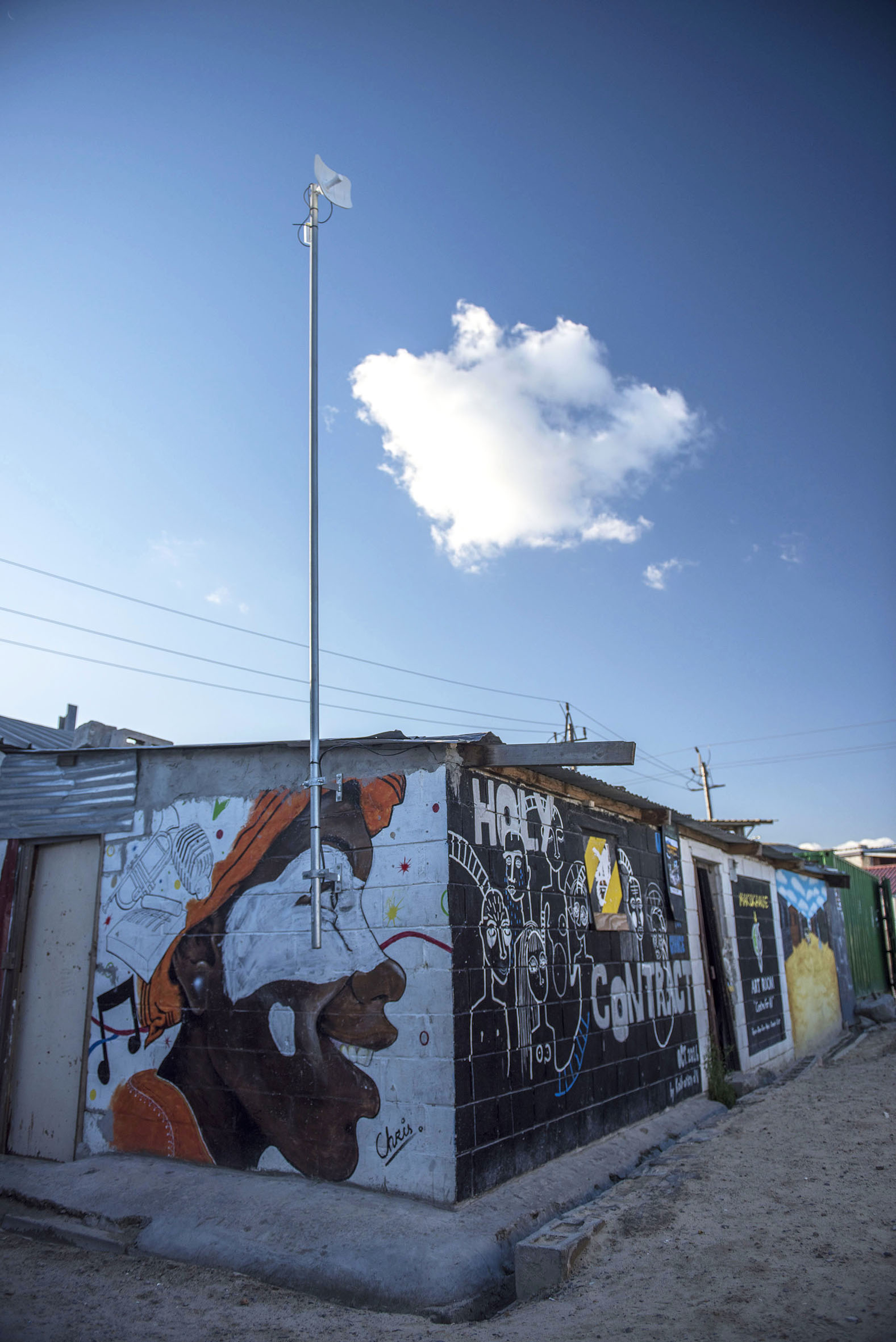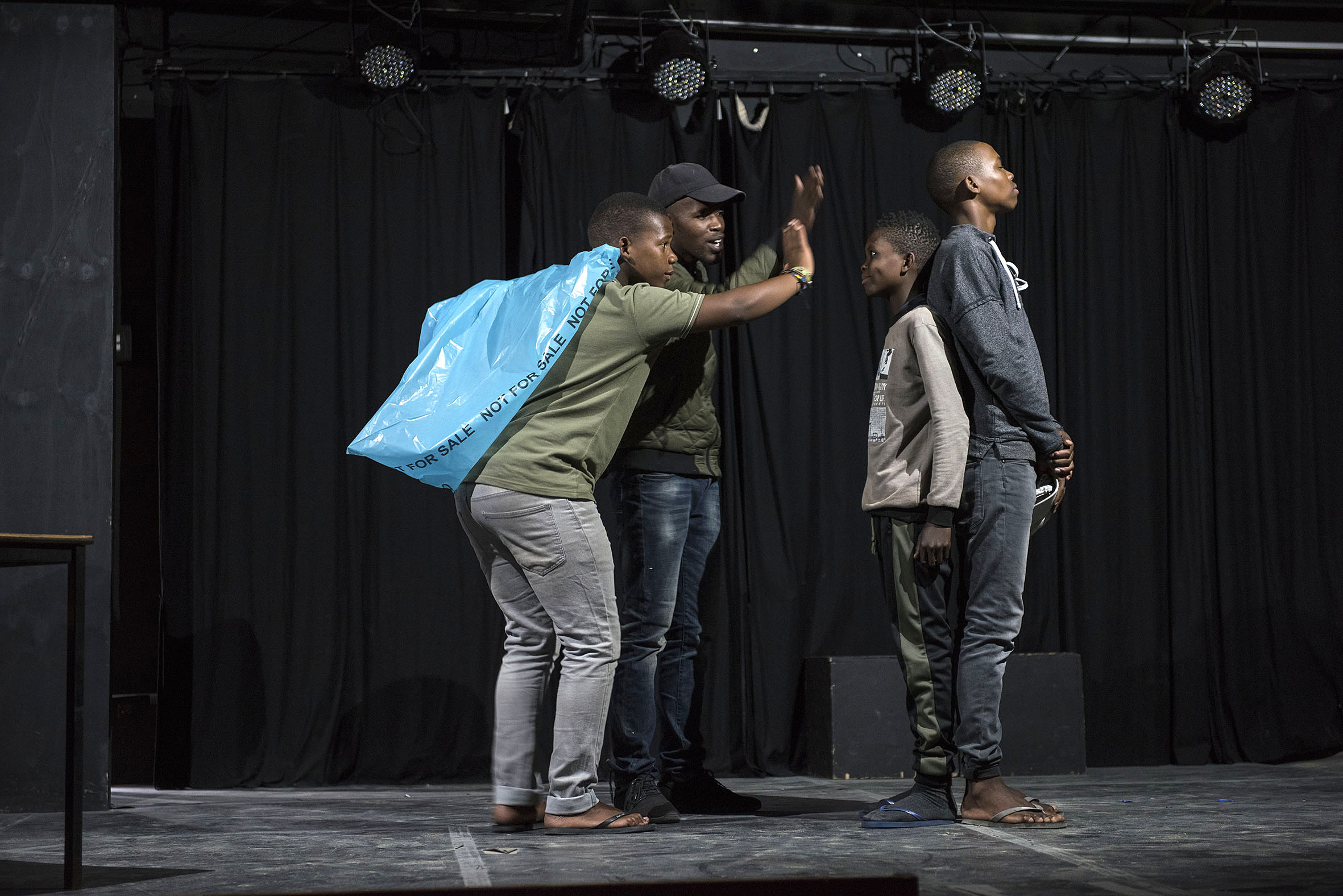Shack Theatre: The Makukhanye Art Room in Khayelitsha transcends its humble surroundings to nurture the artistic aspirations of young people.
‘This is a dream of its own. An authentic dream,” Mandisi Sindo says of the Makukhanye Art Room.
“We proudly call this space a shack theatre, because it is a huge shack surrounded by hundreds of shacks. I believe we have created some history for our generation. Our vision is to show that there is a need for such spaces, eKasi spaces, that will be used to shape young people’s dreams.”
The award-winning Makukhanye is in Khayelitsha, South Africa’s second-largest township. It sits next to the market stalls in Site B.
Outside Makukhanye is an open space lined with walls of vibracrete and corrugated iron, acting as an outside foyer, a waiting area before and after shows. The Makukhanye Art Room logo takes up an entire wall, painted proudly against a black backdrop.
Another wall is painted red with the words “Kasi-2-Kasi” in white lettering in commemoration of a recent festival.
Some of the other walls are decorated with colourful murals, and the rest are covered with the names of productions that have graced its stage. It is a history made alive and visible. On the right-hand side of the waiting area is the main office and library — a modest space, but one that is slowly growing.

[“We call this space a shack theatre”. (David Harrison)]
Contemporary South African theatre work such as Fruit by Paul Noko and Worst of Both Worlds by Bulelani Mabutyana contribute to this growth — both Zabalaza Festival-winning productions have had successful runs at Makukhanye.
At the far end of the opening is a narrow passageway leading to the theatre: a black box with a raised stage, concrete floors, plastic seating, good lighting rigs and solid sound equipment.
A theatre in a township should not be a novelty. Black and brown bodies are often expected to be sites for entertainment, rather than encouraged to seek entertainment. We are called expressive. We are told that we conjure stories out of thin air and tell them with flair. Advertising campaigns constantly remind us that we sing well and have innate rhythm — bursting into song at the slightest provocation. Tourists are compelled to clap and marvel at us.
These so-called innate gifts deserve to be nurtured, trained and refined by institutions, but very often schools and arts programmes are located in the suburbs and city centres. The implication is that townships are sites for mining talent. This talent is then validated elsewhere.
Makukhanye challenges this narrative by being an independent, multifaceted, high-quality performance and rehearsal space for artists and audiences who want to make and access work in Khayelitsha.
Makukhanye also flips the narrative of “quality” on its head. By what value is the quality of productions judged if access to professional equipment and a good performance are not factors?
Makukhanye is not alone in its desire to make accessible art. There are other spaces in Cape Town’s townships such as the Black Box Theatre in Delft, the Zolani Centre in Nyanga, and Guga S’thebe in Langa, which also do this for their own communities.
What is significant about Makukhanye is that it is a shack, one that has struggled to acquire funding from the city and the government. It survives mostly because of independent donors and by pooling community resources.
In 2007, the shack served mainly as a rehearsal space for the Makukhanye Entertainment Act Group run by Thando Mpengezi and Siphosethu Runqu. But it also served as a space where other performance groups in the community could gather, share ideas and share knowledge.

[Performers inside the Makukhanye Art Room (David Harrison)]
In 2012, Sindo became more intimately involved with the space and, three years later, took over Maku-khanye as the artistic director and producer.
The Makukhanye team consists of technical director Bamanye Yeko, Siphosethu Runqu and Sivuwe Sigudu (maintenance) and Siphosethu Dyonase and Lwazi Thezaphi (operations and co-ordination).
In the past three years, Maku-khanye has become a formidable player on the performing arts circuit, most recognisably in theatre. Last year, the Cape Town Fringe Festival recognised the space on the Fresh Fabulous Roll of Honour. This was awarded to fringe spaces in Cape Town that are instrumental in creating and developing work in the city.
This year, Makukhanye was awarded a prestigious Fleur Du Cap award for innovative work. It also became one of the 14 venues used as part of the new Cape Town Fringe Festival circuit. The venues were responsible for curating a number of shows.
Of the 22 shows presented by Makukhanye, eight were nominated. Black Pride won the Fresh “We See You” Award and Khayalethu Anthony of The Champion was awarded the Fresh Creative award for best script.
On June 16, the four-part Black Art & Communities at Heart conversation series was launched. As the recipient of the National Fellowship by the Institute for Creative Arts, Sindo conceptualised the series of “decolonial conversations in a space where it matters”. All four conversations were hosted at Makukhanye and dealt with various topics affecting black art, artists and communities such as “State of the townships”, “Homophobia, Queerness and Patriarchy in the township”, “Defining Community Theatre” and “Liberating Black Artists”.
The importance of these spaces cannot be overstated. For example, at an industry meeting held at the theatre in March this year, artists and stakeholders met in reaction to violent attacks that had left a number of artists injured or dead. The theatre called for the theatre community at large to respond to the violence as one voice.
Makukhanye also commemorates work done by artists in the townships in different ways. One is in the form of the Abongile Kroza One-Hander Festival, a collaboration between Theatre4Change and SMTAX.
Kroza, who died in a car accident in 2012, supported Makukhanye. He was a mentor and coach for young artists, and a gifted performer.
The theatre has also initiated several other events that have now become staples on their calendar, including the annual Vuka Mandela Theatrical Magic production in July, the Healing and Teaching Female Workshop run by a variety of womxn and the Amazing Women Arts Event, which often includes work developed during the workshops.
Currently looking for funders to support the vision, Makukhanye Art Room is a vital and authentic space. It is a shack theatre that historicises the art living in its surroundings.
It validates black talent and black lives — providing training, support and a platform to showcase work within the borders of the township. It is a space in which conversations that concern the community are held with the community.
Makukhanye simultaneously highlights structural oppression and subverts the expectations caused by racism and classism.
Spaces such as these are needed in eKasi and will be used to shape young people’s dreams.